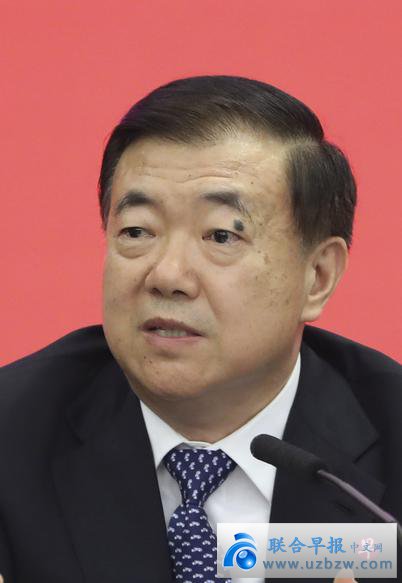 The prosecution accused Wang Sanyun of accepting bribes for more than 20 years, which shows that he is also corrupt and promoted.(China News Service)
The prosecution accused Wang Sanyun of accepting bribes for more than 20 years, which shows that he is also corrupt and promoted.(China News Service)
Prosecutors in Zhengzhou accused Wang Sanyun of accepting bribes, spanning more than 20 years from when he served as secretary of the Liupanshui Municipal Party Committee in Guizhou Province to when he served as secretary of the Gansu Provincial Party Committee.
More than a year after he was sacked, Wang Sanyun, the former secretary of the Gansu Provincial Party Committee of the Communist Party of China, will be tried in Zhengzhou, Henan.Zhengzhou prosecutors accused Wang Sanyun of using his power to seek benefits for others and illegally accepting huge amounts of property from others. He should be investigated for criminal responsibility for the crime of accepting bribes.
After the 18th Communist Party Congress in November 2012, at least seven provincial party secretaries have been sacked, six of whom have been sentenced.The one with the heaviest sentence was Bai Enpei, the former secretary of the Yunnan Provincial Party Committee, who was sentenced to death with a reprieve and life imprisonment without commutation or parole. Huang Xingguo, the former acting secretary of the Tianjin Municipal Party Committee, who received the shortest sentence, was sentenced to 12 years in prison.
The 66-year-old Wang Sanyun started his political career in Guizhou Province and served as secretary of the Guizhou Provincial Party Committee of the Communist Youth League.In 1992, Wang Sanyun was transferred from the secretary of the Guizhou Youth League Provincial Committee to the secretary of the Liupanshui Municipal Committee of the Communist Party of China, Guizhou Province. Since then, he has been promoted all the way., In 2011, he served as Secretary of the Gansu Provincial Party Committee.
From 2001 to 2002, when Wang Sanyun served as the deputy secretary of the Sichuan Provincial Party Committee, Zhou Yongkang, then Secretary of the Sichuan Provincial Party Committee, was his immediate boss.Later, after Zhou Yongkang fell from power, Wang Sanyun was not greatly affected.Analysts believe that this is not only because Wang Sanyun and Zhou Yongkang have only worked together for more than a year, but also because they are not from the same faction.
Prosecutors in Zhengzhou accused Wang Sanyun of accepting bribes, spanning more than 20 years from when he served as secretary of the Liupanshui Municipal Party Committee in Guizhou Province to when he served as secretary of the Gansu Provincial Party Committee.
In July last year, it was officially announced that Wang Sanyun, who had already served in the National People's Congress, was under investigation for serious violations of discipline and law.In September last year, the Central Commission for Discipline Inspection reported that Wang Sanyun seriously violated political discipline and rules, and was indifferent to the four consciousnesses.Superstitious activities; violating the spirit of the eight central regulations, entering and leaving private clubs in violation of regulations; violating organizational discipline, disregarding the party's selection and appointment system and organizational principles, allowing cadres with violations of discipline to choose leadership positions, providing assistance to others in the selection and appointment of cadres, andAccepting property; violating integrity and discipline, accepting gifts and gifts; seeking benefits for others and accepting huge amounts of property, suspected of accepting bribes.
In September last year, the TV feature film Inspection Sword made by the Central Commission for Discipline Inspection disclosed some plots of Wang Sanyun's bribery.After Wang Sanyun became the secretary of the Gansu Provincial Party Committee, some bosses who were close to him before also went to Gansu to develop, and Wang Sanyun helped them in obtaining projects and passing approvals.At the same time, Wang Sanyun condoned and even instructed his son and two nephews to undertake projects in Gansu.
After Wang Sanyun was sacked, several of his former secretaries were also implicated, including Wang Xiaoguang, who was already the vice-governor of Guizhou Province.On April 1 this year, it was officially announced that Wang Xiaoguang was suspected of serious violations of discipline and law, and he was subject to disciplinary review and supervisory investigation.Wang Xiaoguang is also the first senior provincial official to be sacked since the establishment of the National Supervisory Commission in March this year.
In addition, Tang Xinghe, Wang Sanyun's secretary in Anhui and Gansu, the former deputy secretary-general of the Gansu Provincial Party Committee, and the former director of the Provincial Party Committee's Policy Research Office, was investigated before Wang Sanyun's fall.Some media said that the Tang Xinghe case became a breakthrough in the Wang Sanyun case.
The official media also announced yesterday that Zhou Chunyu, the former vice-governor of Anhui Province, and Cai Xiyou, the former general manager of Sinochem Group, were also prosecuted by the prosecution and will stand trial.
Zhou Chunyu was the secretary of Wang Taihua, the former secretary of the Anhui Provincial Committee of the Communist Party of China in his early years, and later became the secretary of the Bengbu Municipal Committee of the Communist Party of China, Anhui Province.investigation.Zhou Chunyu thus became the youngest vice-governor to be sacked.
State media once criticized Zhou Chunyu for wanting to be an official while also wanting to make a fortune. Prosecutors charged him with four crimes of accepting bribes, concealing overseas deposits, abusing power, and insider trading.Among them, the amount of property illegally received from others was particularly huge; the circumstances of abuse of power caused national economic losses were particularly serious, and as a person with insider information on the relevant stock, the circumstances were particularly serious when he bought the stock before the inside information was made public.



